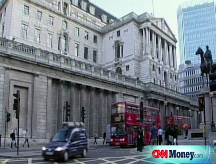Stocks fall, Wall St. counts days to 2009
Major indexes slump as investors weigh mixed economic data and concerns about the auto industry.
NEW YORK (CNNMoney.com) -- Stocks fell Tuesday in a sparsely traded session as the market limps toward the end of a brutal year.
The market had drifted lower for most of the day, but losses accelerated in late afternoon trade.
The Dow Jones industrial average (INDU) ended down 100 points, or 1.2%, for the day. The Standard & Poor's 500 (SPX) index slid nearly 1% and the Nasdaq composite (COMP) ended 0.7% lower.
Stocks tumbled Monday after Toyota (TM) warned it will suffer an operating loss next year and Credit Suisse downgraded General Motors. Concerns about fourth-quarter corporate results and falling oil prices also weighed on the market.
Automakers remained under pressure as investors looked past the Bush administration's $13.4 billion loan package for GM and Chrysler to focus on the grim long-term outlook for the sector. GM (GM, Fortune 500) fell nearly 14% and Ford Motor (F, Fortune 500) tumbled 16%.
Oil prices fell below $39 a barrel while the price of gold also settled lower. Prices for U.S. Treasury bonds fell as the government auctioned off another $28 billion in debt.
"Investors are looking to protect their positions into the end of the year," said Ryan Larson, senior equity trader at Voyageur Asset Management in Chicago. "Nobody's willing to take new positions."
Trading is expected to be volatile for the remainder of the week, with many market participants out for the holiday. Markets will close early on Wednesday and will remain shuttered on Thursday for the Christmas holiday.
"On light volume days you just want to see the market trade flat," said Larson. "Down a quarter-percent is considered a win."
The glum tone of Tuesday's session was set early by a raft of economic reports on housing, consumer sentiment and gross domestic product.
"We've compacted a lot of economic data into one day," said Art Hogan, chief market analyst with Jefferies & Co. in New York. But the market has already "priced in" much of the bad news, he added.
"Today's data is either expected to be sloppy or is backward-looking," Hogan said.
Market breadth was negative. Declining shares outpaced advancers roughly two-to-one as about 37 million shares changed hands on the New York Stock Exchange.
Housing: The National Association of Realtors said sales of existing homes fell 8.6% in November to a seasonally adjusted annual rate of 4.49 million units from a downwardly revised 4.91 million units in October. November sales are down more than 10% versus last year and were weaker than the 4.93 million units economists forecasted.
The Realtors also said that the median existing home sold for $181,300 in November, down 13.2% from a year ago when the median was $208,800.
Separately, the Census Bureau said sales of new homes fell 2.9% in November to a seasonally adjusted annual rate of 407,000 from a downwardly revised total of 419,000 in October. That tally was worse than the seasonally adjusted 420,000 that economists forecasted.
While the data "surprised us on the down side," the ailing housing market "is certainly something where we've factored in a lot of bad news already," Hogan said.
Many economists say a recovery in the housing market is a crucial step towards restoring the economy's health and limiting the current recession.
Consumers: The University of Michigan unexpectedly revised its consumer sentiment index higher to a reading of 60.1 from the 59.1 it announced on Dec. 12. Economists surveyed by Briefing.com had forecast a downward revision to 58.6.
"The most significant change recorded in the December survey was the record plunge in inflation expectations," said Richard Curtin, the director of the University of Michigan Surveys of Consumers in a statement.
Still, Curtin warned that rising unemployment and the weak economy remain major concerns for consumers.
Investors are concerned about the outlook for consumer spending, which makes up the bulk of the nation's overall economic activity, as American households continue to curtail spending.
GDP: The Commerce Department said before the market opened that gross domestic product, the broadest measure of the nation's economy, shrank at a 0.5% annual rate in the third quarter. It was the third and final revision for third-quarter GDP, and the decline was in line with economists' expectations.
AmEx: The credit card company-turned-commercial bank said it has received preliminary approval for a $3.9 billion government bailout investment.
The capital injection will come from the Treasury Department's $700 billion Troubled Asset Relief Program, which in part provides capital to banks. If approved, American Express (AXP, Fortune 500) would be the ninth-biggest capital investment of the more-than 100 investments Treasury has made in banks so far.
Shares of the company fell 2.5% despite the news.
Bonds: The benchmark 10-year note rose 3/32 to 114 1/32, and its yield rose to 2.16% from 2.14% on Monday. Treasury prices and yields move in opposite direction. The 10-year yield dipped below 3% in November for the first time since the note was first issued in 1962.
Lending rates were mixed. The 3-month Libor rate held steady at 1.47%, according to Bloomberg. The overnight Libor edged up to 0.12% from 0.11% Monday. Libor is a key bank lending rate.
Other markets: In global trading, Asia markets ended lower with the Hang Seng in Hong Kong falling nearly 3%. Japan's Nikkei was closed. Major indexes in Europe were mixed.
The dollar fell versus the euro and the yen.
U.S. light crude oil for February delivery slid 93 cents to settle at $38.98 a barrel in New York.
COMEX gold for February delivery was fell $9.10 to settle at $838.10 an ounce.
Gasoline prices fell overnight to a national average of $1.659 from $1.663 a gallon, according to a survey of credit-card swipes released Monday by motorist group AAA. ![]()



